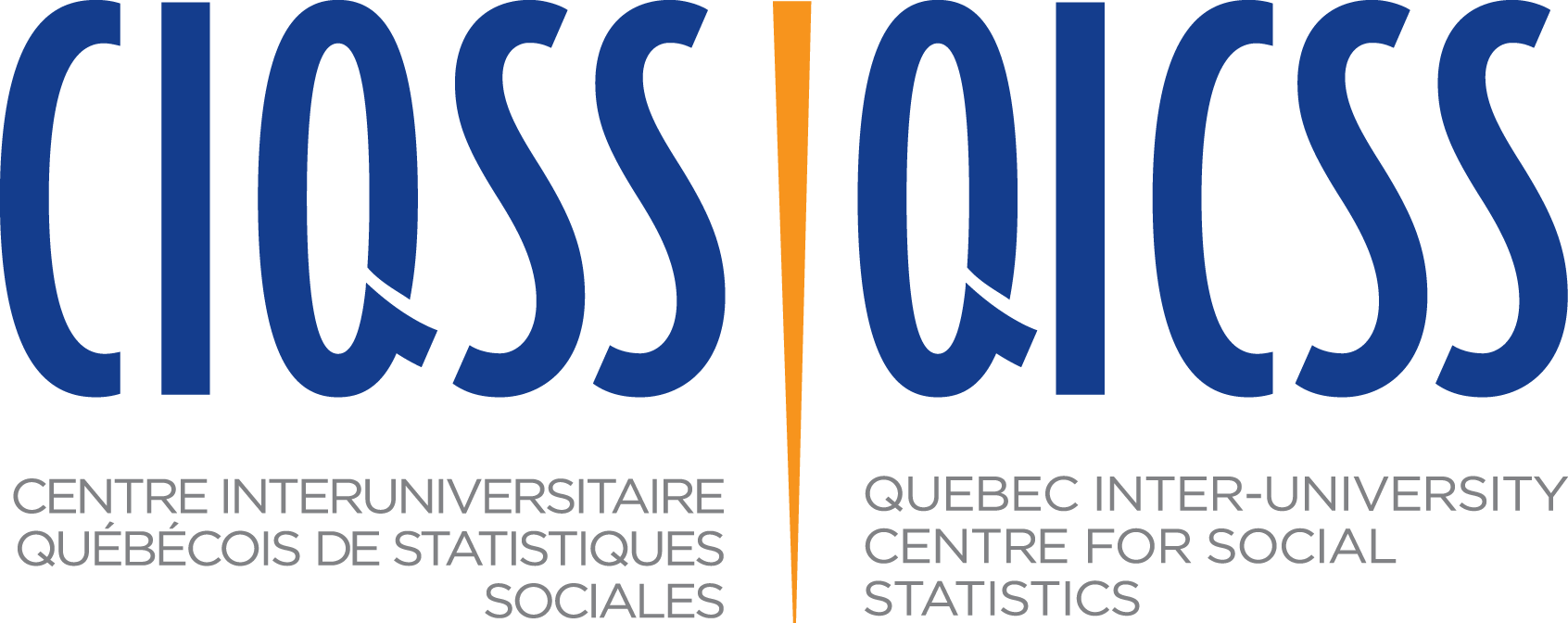New datasets available at QICSS
- Employment Insurance Coverage Survey (EICS) -2018
- Canadian Housing Survey (CHS) 2018
- The British Columbia Ministry of Education Kindergarten to Grade 12 (BCK-12) file. The BCK-12 can be linked to T1 Family File (T1FF) and to Census 2016 - additional component produced contains parental tax outcome information
New datasets available at QICSS
- National Cannabis Survey (NCS) 2019 - Wave 4
- Healthy Aging Phase 2: New Canadian Community Health Survey data has been linked to the Canadian Cancer Registry, the T1 Family Files and to the Census (short form) data
- Update - 2011 Canadian Census Health and Environment Cohort (CanCHEC) - Update
- Community Noise and Health Study (CNHS) 2013 - Update
COVID-19 webinar series
CRDCN is proud to present a series of panel discussions related to COVID-19. This webinar series will engage CRDCN researchers, Statistics Canada subject matter experts and government policy-makers to:
- Identify emerging questions for COVID-19 related research and corresponding data needs
- Inform policy-making and program decisions in the immediate and mid-term
- Facilitate collaborative research and data development to inform Canada's COVID-19 response
Register for any upcoming sessions below or review those you missed. Following the introductory session on May 14th, four additional webinars will focus on one of our strategic research areas.
Click here to view summaries and videos
May 14 12:00 - 1:00 p.m. RESEARCH FOR POLICY - RESPONDING TO COVID-19
Panelists
Anil Arora, Statistics Canada, Chief Statistician of Canada
Andrew Bjerring, CRDCN, Chair of the Board
Rodney Ghali, Privy Council Office, Assistant Secretary to the Cabinet
Céline Le Bourdais, McGill University, Distinguished James McGill Professor of Sociology and Vice-Chair of the CRDCN Board
May 25 1:00 - 2:00 p.m. INCOME AND EMPLOYMENT
Panelists
Andrew Heisz, Statistics Canada, Director - Centre for Income and Socioeconomic Wellbeing
Kevin Milligan, University of British Columbia, Professor of Economics
Louis Morel, Employment and Social Development Canada, Director General - Economic Policy
Mikal Skuterud, University of Waterloo, Professor of Economics
May 26 1:00 - 2:00 p.m. EDUCATION AND SOCIAL DEVELOPMENT
Panelists
Alexandra Blair, Dalla Lana School of Public Health (University of Toronto), Postdoctoral Researcher
Marc Frenette, Statistics Canada, Assistant Director and Research Manager - Social Analysis and Modelling Division
Catherine Haeck, Université du Québec à Montréal, Associate Professor of Economics
Cindy Perry, Ministry of Children, Community and Social Services (Ontario), Director - Policy Research and Analysis Branch
May 27 1:00 - 2:00 p.m. IMMIGRATION AND SETTLEMENT
Panelists
Monica Boyd, University of Toronto, Professor of Sociology
Jeslyn Thibedeau, Immigration, Refugees and Citizenship Canada, Assistant Director - Outcomes Analysis Unit
Ted McDonald, University of New Brunswick, Professor of Economics
Li Xue, Statistics Canada, Director - Social Analysis and Modelling Division
May 28 1:00 - 2:00 p.m. POPULATION HEALTH AND HEALTH SERVICES
Panelists
Tracie Afifi, University of Manitoba, Professor of Community Health Sciences
Julie Bernier, Statistics Canada, Director - Health Analysis Division
David Green, University of British Columbia, Professor of Economics
Rhonda Kropp, Public Health Agency of Canada, Assistant Vice President - Infectious Disease Prevention and Control Branch
This event is presented in partnership with Statistics Canada
Statistics Canada Research Data Centre (RDC) Alternatives: Conducting Research During COVID-19
This webinar will be of particular interest to graduate students and faculty - please share widely within your institutions!
Recent physical distancing protocols pertaining to the COVID-19 Pandemic have meant that RDC researchers need to find alternative ways of carrying out their research. This webinar will be of interest to graduate students, librarians, faculty and researchers. The Real Time Remote Access (RTRA) program offers one alternative way to access confidential Statistics Canada data. Other options include using the Statistics Canada public use files and analyzing data from other sources.
The presenters will discuss the differences between the data that can be accessed through the RTRA vs. the RDC. RTRA data is a very useful option for some types of questions but also has some important limitations. In addition, they will highlight alternative sources of data from the U.S. and elsewhere that are similar to the Statistics Canada master datasets. These may be particularly useful for graduate students who may not be able to wait for the RDC to re-open but who need to conduct analyses that are more sophisticated than what the RTRA or public use files will permit.
Presenters:
Elizabeth Hill has been a data librarian at Western University since 1998. She has served as Chair of the Statistics Canada`'s Professional Development Committee of the Data Liberation Initiative (DLI), and is currently a member of the DLI External Advisory Committee, representing Ontario. She has also been a member of Portage Training Expert subgroups, RDM 101 and Repositories 101. She has presented at IASSIST on topics related to data access, data portals and training.
Kristi Thompson has been the research data management librarian at Western University since 2019, and previously held positions as data librarian at the University of Windsor and as a data specialist at Princeton University. Her involvement with Portage includes participating on the FRDR Policy and User Experience working groups and the Dataverse North Policy working group. She co-edited the book Databrarianship: the Academic Data Librarian in Theory and Practice for ACRL and has published on topics ranging from international data sources to aboriginal sports practices.
Date: Wednesday, May 20, 2020 / Time: 2:30 PM – 3:30 PM EDT
COVID-19-related Research Proposal
Statistics Canada is evaluating proposals to grant some researchers remote access to confidential data for COVID-19 research that will yield short-term deliverables for government policy and program decisions. Proposals must include at least one letter of support from a senior official responsible for COVID-19 policy or program making (e.g., provincial Ministry of Finance, Ministry of Health, etc.)
In order to be considered, the project outlined in the research proposal must:
1. clearly support COVID-19 decision-making in the immediate term; and
2. provide results in an appropriate form for policy and decision-making (e.g., journal article published next year is not appropriate for the proposal).
All proposals will be reviewed by a management review committee at Statistics Canada that will provide recommendations to the Chief Statistician of Canada. If your proposal meets the criteria described above, please submit a preliminary research proposal to Gabrielle Beaudoin, Director General, Data Access and Dissemination at Statistics Canada.
See the template for a proposal below:
The Real Time Remote Access System as an alternative to Research Data Centres
Statistics Canada is aware of the impact of the closure of Research Data Centres. Therefore, some of the conditions of its Real-Time Remote Access System (RTDA) have been relaxed.
- A six month-free subscription is available for all researchers from all Quebec and Canadian universities.
- Requests for access will be processed faster than usual (within 2 to 4 days). (Generally, it can take up to two weeks to process a request.)
- Data requests directly related to the COVID-19 Pandemic will be considered (except for business data).
What is Real Time Remote Access?
The RTRA system allows users to run SAS programs, in real time, against microdata located in a central and secure location.
Researchers using the RTRA system do not gain direct access to the microdata and cannot view the content of the microdata file. Instead, users submit SAS programs to extract results in the form of frequency tables. RTRA users can calculate frequencies, means, percentiles, percent distribution, proportions, ratios, and shares.
The RTRA system uses an Electronic File Transfer (EFT) service to enable organizations outside of Statistics Canada to exchange electronic files in a secure manner using the Internet.
Which data are available?
RTRA was developed for social survey data and administrative data. Census data for example are not available through the RTRA system. The complete list of data sets available can be found here.
How to make an application?
Detailed instructions for gaining access are available on Statistics Canada website. For more information on the RTRA ‚ please email: [email protected]. Webinar to learn how to use the system can be offered. If you are interested in participating in a Webinar, please contact us at [email protected].
Annonce du Budget du Québec concernant l'accès aux données
Dans son Budget déposé le 10 mars 2020, le gouvernement du Québec prévoit des investissements de 30 millions de dollars dans le cadre du budget 2020-2021 afin de (1) bonifier le processus d’accès aux données pour la recherche (2) optimiser l’infrastructure informatique liée à l’accès aux données et (3) soutenir la Commission d’accès à l’information du Québec.
Le Budget prévoit l'expansion du réseau des Centres d'accès aux données de recherche de l'ISQ (CADRISQ) notamment en milieu universitaire à l'Université de Sherbrooke et à l'Université McGill. D'autres CADRISQ seront mis en place dans certains centres hospitaliers universitaires. Ces centres d'accès aux données de recherche en milieu universitaire s'ajouteront à celui situé dans les locaux du CIQSS à l'Université de Montréal.
Le plan budgétaire est accessible ici.
Journée scientifique 2020 - Réseau de recherche en santé des populations du Québec (RRSPQ)
Inscrivez-vous à la Journée scientifique du RRSPQ! - Le 19 mars 2020 au Campus Longueuil de l’Université de Sherbrooke.
Le thème cette année : Intégration des connaissances dans les pratiques et les politiques liées à la santé des populations : équité, inclusion, et diversité.






